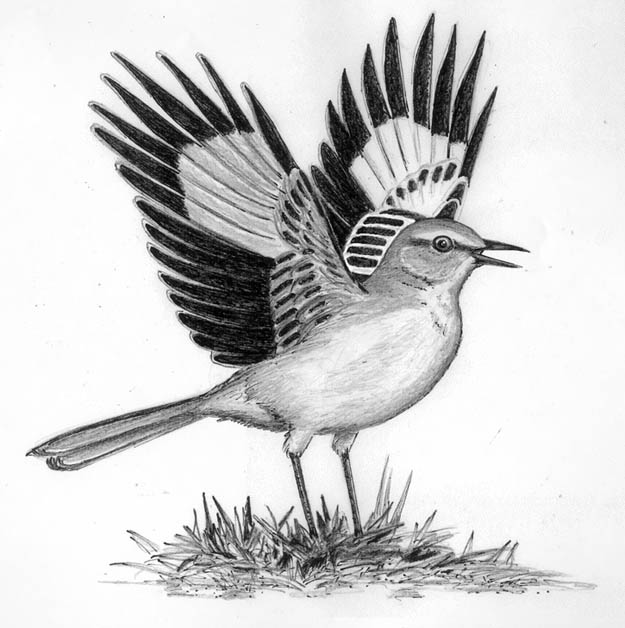
Dear Bird Folks,
Have you ever written a column about mockingbirds? If not, could you please tell me something about them? Also, in Harper Lee’s classic novel, To Kill a Mockingbird, the main character, Atticus Finch, said, “It’s a sin to kill a mockingbird.” Any idea why?
– Edie, Falmouth
Six times, Edie,
Over the years I’ve written six different columns about mockingbirds. But don’t feel bad about not knowing. Until I looked it up, I didn’t know it either. Since it’s been a while since my last mocker column, I’m more than happy to write a new one…especially now that there’s “sin” involved. That’s one topic I’m totally familiar with.
Ironically, the “Northern” Mockingbird is more popular in the South, where it is the official bird of five Southern states. It used to be six states, but in 1948 South Carolina voted to switch from the mockingbird to the Carolina Wren. I’m not really sure of the reason for the change, but I’d bet gerrymandering had something to do with it.
When compared to bluebirds and cardinals, mockingbirds aren’t much to look at. Their popularity is undoubtedly related to their vocal skills. A male mocker is an avian karaoke machine. He may know as many as 200 different songs, most of which are impressions of other birds. Unfortunately, the mockers’ singing talents nearly led to its demise. In the 1800s, thousands of them were captured for the dreaded caged bird industry. Both adults and babies were routinely trapped and sold for as much as $1,200 (adjusting for inflation) throughout the country and in Europe. Laws eventually protected the birds and today mockers can be found in most states, including Hawaii. However, the Hawaiian birds were likely introduced…or are just vacationing. In addition to their vocal array, mockingbirds have two other notable behaviors. On any given summer’s night, when all of the other birds are fast asleep, mockingbirds will wake up and loudly break into song. This is especially true on a full moon or if there’s a bright streetlight nearby. Why do they do this? These nocturnal singers tend to be unmated males that are singing in a desperate attempt to find a mate. That’s great, but what female wants to hear singing at 3AM? I know my wife hates when I do it.
The other mockingbird behavior of note is “wing-flashing.” For the most part, mockers sport rather dull gray outfits. But like Willets, this all changes when the birds open their wings and expose a pair of bright white patches. The white is noticeable in flight, but the birds will also flash these patches when they are upset or when they are foraging. It happens like this: A mocker will be poking along the ground, when it’ll suddenly lift its wings over its head, as if it’s being arrested. The reason for the forage flashing isn’t totally understood, but as usual, there are plenty of guesses. The most common theory has to do with exposing prey. Hiding insects react to the sudden white flashing, which, in turn, reveals their presence to the hungry birds. Another theory is about discouraging predators. By flashing their wings, mockers appear to be agitated and on high alert, causing predators to think twice about attacking. Even predators don’t want to mess with a bird that’s acting like a psycho.
As I mentioned earlier, despite the name, Northern Mockingbirds tend to be southern birds. At the turn of the last century, very few of them were found in Massachusetts. Eventually though, our ornamental plantings, especially multi-flora rose, provided the food the birds needed to remain in the north year-round. Mockingbirds are now fairly common breeders in the Bay State, although I’m starting to wonder about Cape Cod. Based merely on my own observations, there seems to be fewer mockers around here in the winter. I mentioned my concern to another birder and he pointed a finger at the wintering robins and their huge appetites. Mockingbirds are one of the few birds that will stay and defend a winter food supply (usually a berry bush or two). With their harsh calls and flashing wings, the aggressive mockers can intimidate most intruders, but they have no chance against a flock of ravenous robins. Just ask any worm.
This brings us to the second part of your question: Why did Atticus Finch declare it a sin to kill a mockingbird? As you might imagine, I’d consider it a sin to kill any bird. But if I were Atticus Finch, I’d be more interested in protecting finches than worrying about mockingbirds. Wouldn’t that make more sense? Scholars have been analyzing To Kill a Mockingbird for decades and while it’s possible the quote is a clever metaphor for some of society’s shortcomings, it could also be that Atticus is simply telling Scout (his daughter) that mockingbirds should be appreciated. They don’t cause us any problems, are willingly to share their wonderful songs, and thus, should not be silenced by anyone. That’s the explanation I like best. Clever metaphors can wait for another day.
There’s a lot to like about mockingbirds, Edie. While they might occasionally eat some of our fruit, they also give us hours of beautiful singing. And I think we all enjoy hearing their songs…unless it’s a summer night and one is loudly singing outside of a bedroom window. Then it might be a different story.